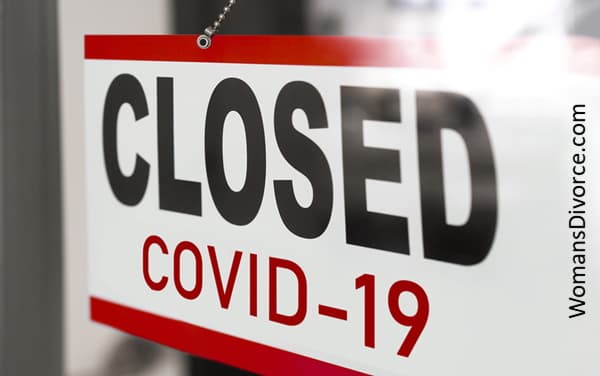- Home
- Divorce Basics
- Divorce During the Pandemic
Working on Your Divorce During the Pandemic
Can you still do your own divorce during the pandemic? Thanks to the stay-at-home orders due to the COVID-19 pandemic, many court personnel are working remotely, so divorce hearings will likely be postponed for a while. But you can still do a lot of preliminary work while you're sheltered at home, as pointed out by the following article.
COVID-19: What do you do now... about your divorce?

By: Jania Mkunga
For several months or even years now, you were thinking about filing for divorce. Now the question is whether you can still move forward with your plans. There is a lot to unpack here in these uncertain times. While there are no easy answers about the social, health and economic new normal many are experiencing, one thing is clear - you know you need a cost-effective divorce.
This may translate into coming to terms with your current financial realities and the new opportunities that are before you. Before you begin this journey, you may consider “looking within” to find your strengths and answer whether you are the right person to do your own divorce.
Here is a short list of opportunities before you today for you to become your own advocate, if you so choose.
1) The Time Factor
With extra time on your hands, you can now dedicate some of it to understanding just what the Self-help tab of your Family Law Court website has to offer. In most jurisdictions, the Family Law judiciary system is user-friendly.
In our legal system, one cannot be denied justice due to lack of money. The courts are mandated to provide a platform very similar to those of attorneys for self-representing litigants to participate in processing their own divorce. And filing fees are often waived based on income.
There is a long history of civil rights laws in the judiciary system that protect the disadvantaged. Provisions have been made for self-litigants in all sectors of the judiciary system. Self-representation is not something you should shy away from, if you are so inclined. It is your basic civic right.
2) Local Libraries are closed, but you can still use the internet!
Unleash the 24x7 power of the cell phone in your palm. Take a break from the social media frenzy. Instead, search professional articles and websites in your local jurisdiction and get expert opinions on self-representation about divorce matters. You will be pleasantly surprised how easy it is to Do-It-Yourself!
To get started you can do a Google search for self-help divorce in your state. Another option is to visit LawHelp.org, a website dedicated to helping people find the information and resources they need for their state.
3) Give your divorce the same energy you give your job!
If you want to know whether you can do your own divorce, the first thing you may consider doing is a personality inventory. For example, some questions to ask yourself are:
- How do you conduct business at work?
- What are your work ethics?
- How successful are you at meeting deadlines?
- What kind of rapport do you have with your colleagues?
- How do you participate in meetings?
- Are you a good listener?
- Are you a talker or the note taker?
- Are you computer savvy?
4) Learn the rules of Civil Procedure in Family Law
You need to treat the information you gather the same way you do when your boss asks you what you learned in the training class he just paid thousands of dollars for you to attend. The courts adhere to certain rules of civil procedure and expect pro-se litigants to know these rules.
5) Understand and focus on key items worth fighting for in your divorce.
Is it custody, property, financial accounts, the business you started together or one you started and you both made successful during your union? Understand these complexities and how your state mitigates complex community property issues and the like.
6) What is your Emotional IQ?
Can you keep your cool in court hearings in front of an obnoxious judge or lawyer who seems to be a new clone of your soon-to-be ex-spouse? It is vital to remain composed during court hearings to be taken seriously.
In Conclusion
These are just a few things to keep in mind if you decide to work on your own divorce during the pandemic. If you think you're up to the task, then Get Going! “You are your own liberator!”
Jania Mkunga aspires to provide around-the-clock divorce information to women experiencing divorce and those bereaved in Maricopa County, Arizona.
Being quarantined together can stress even good marriages, but for some couples it can also signal that it's time to call it quits. Recent research on US divorce rates during the COVID-19 pandemic points out some interesting findings:
- Interest in separation and getting divorced peaked on April 13 - approximately 3 weeks into the lock-down in most states
- The majority of couples seeking divorce (58%) had been married for less than 5 years.
- Of couples seeking a divorce agreement, 20% had been married five months or less (which was two times the rate of 2019)
- 45% of divorcing couples had children
The fallout from the pandemic will likely have a long-term impact on both marriage and divorce rates.
Related:
